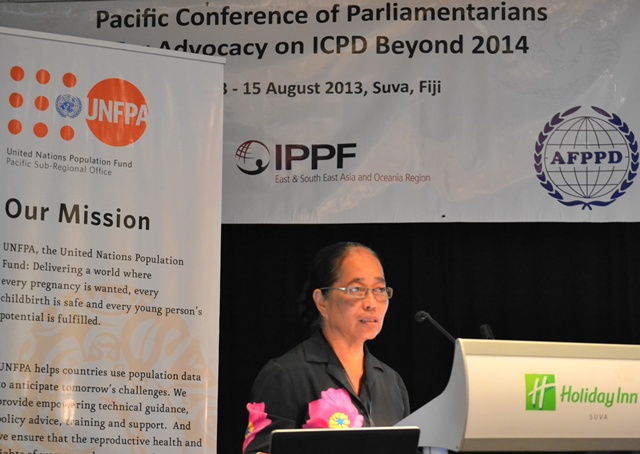August 18, 2013, Suva (UNFPA) - Pacific senior policy makers and parliamentarians representing Micronesia, Melanesia and Polynesia have ended the Pacific Conference of Parliamentarians for Advocacy on ICPD Beyond 2014 with a declaration of recommitment to people-centred national development plans.
The Moana Declaration features 18 recommendations including the creation of an enabling environment to ensure access to sexual and reproductive health and rights for all people and without discrimination, the incorporation of sexual and reproductive health-related issues in development strategies and increased participation of women and young people in decision-making processes.

The leaders reaffirmed their commitment to the International Conference on Population and Development (ICPD) Programme of Action (PoA) which 179 world leaders adopted in Cairo in 1994.
The conference was organised by the United Nations Population Fund (UNFPA), in collaboration with the Asian Forum of Parliamentarians on Population and Development (AFPPD) and International Planned Parenthood Federation (IPPF) to also facilitate the formulation of the region's contribution to the global conversation towards a new (global) development agenda beyond 2015, when the 20-year ICPD PoA and the Millennium Development Goals (MDGs) end in 2014 and 2015 respectively.
"I have to say we've just seen Parliamentarians now leave with the commitment to changing things at national and community level, that will be the best outcome that you could expect," UNFPA Deputy Executive Director (Programme) Kate Gilmore said Thursday (August 15).
"They have said we want to slow down this pattern of teenage pregnancy and make sure that access to contraception allows the young women of the Pacific islands choices about when to have kids, how many and at what intervals."
"And they have said: Look unless we can bring women into the tables of decision-making, unless we have young people participating in our decisions then whatever the future holds for the Pacific, it won't be at the standard that it could be."
The conference was officially closed by Fiji's Minister for Health Dr Neil Sharma who spoke of partnership among leaders, in applying their collective wisdom on issues related to population and development.
"Alliances need to be made to progress our commonalities in our blue continent. The talanoa sessions should leave with each one of us specific take-home messages, totally relevant to our individual country-level needs," Dr Sharma said.
"Pacific governments have continued to struggle to close in their target range for reasons which include social, economic and physical constraints which need to be addressed in the next development agenda, post-2015."
Participants also agreed to institutionalize mechanisms through which support whether technical, advocacy or otherwise, could be generated by a political leader wishing to advance issues related to the ICPD or sexual and reproductive health and rights.
The leaders declared that as Pacific Parliamentarians, they would advocate to:
1. Make sexual and reproductive health an integral part of national development strategies, health plans and public budgets, with clearly identifiable allocations and expenditures.
2. Ensure access to sexual and reproductive health and rights for all our peoples, without discrimination.
3. Address the cross-cutting nature of population issues, vulnerability to climate change, globalization and environmental degradation.
4. Increase women's and young people's participation in decision making and in political, social and economic processes at all levels;
5. Increase support and protection for girls and young women, including enhancing access to education and comprehensive mechanisms for ensuring their access to SRH information and services.
6. Support inclusive sustainable development strategies, and respond to specific needs of persons with disabilities, vulnerable and marginalized groups.
7. Prioritize couples and individuals' access to contraception and information to make free and informed decisions about the number and timing of children, thereby preventing unwanted and unplanned pregnancies, and reducing the need for abortion;
8. Eliminate all forms of violence against women and girls integrate responses to gender-based violence in all sexual and reproductive health programmes and services;
9. Prioritize adolescent and sexual reproductive health and rights, including through comprehensive sexuality education, and establish accessible SRH and mental health services for youth in schools and other educational institutions, youth organizations, faith based organizations and communities, ensuring their meaningful participation.
10. Scale-up national efforts to halt the spread of STIs and HIV, and meet the goal of ensuring universal access to HIV education, prevention, treatment, care and support, free of discrimination; including removing legal and policy barriers that impede access for key affected populations;
11. Recognize the heightened social and economic risk factors for Non-Communicable Diseases (NCDs) confronting the peoples of the Pacific, and take action to strengthen prevention and control of these disease which have significant impact on Pacific populations;
12. Address the unprecedented pace of population ageing in some Pacific nations, and the need to prepare for its social and economic implications for individuals, families, societies and the Pacific community;
13. Address internal and external migration, urbanization and urban growth in the Pacific so that the growing number of urban residents, including the poor, have secure access to land, housing, water, sanitation, energy and transport, as well as health, education and other essential services; address the root causes of migration and poverty.
14. Apply a human rights-based approach to the issues of internally displaced persons, refugees and asylum seekers in the Pacific.
15. Effectively contribute to reshaping the ICPD Beyond-2014 and Post-2015 Development Agenda at the regional and global levels through our strong advocacy and participation, in order to speak with a strong voice around these priority issues;
16. Support the establishment of Pacific country-level parliamentary groups so that supportive political leaders can advance these ICPD Beyond 2014 issues within an SRHR agenda.
17. Support active alliances between parliamentary groups, fostering Pacific regional and international networks for technical and advocacy support;
18. Emphasize the importance of generating, collecting and using and disseminating quality and timely census, statistical and vital registration systems data which is disaggregated for the purpose of planning, monitoring and evaluation.
Click here for more information.


